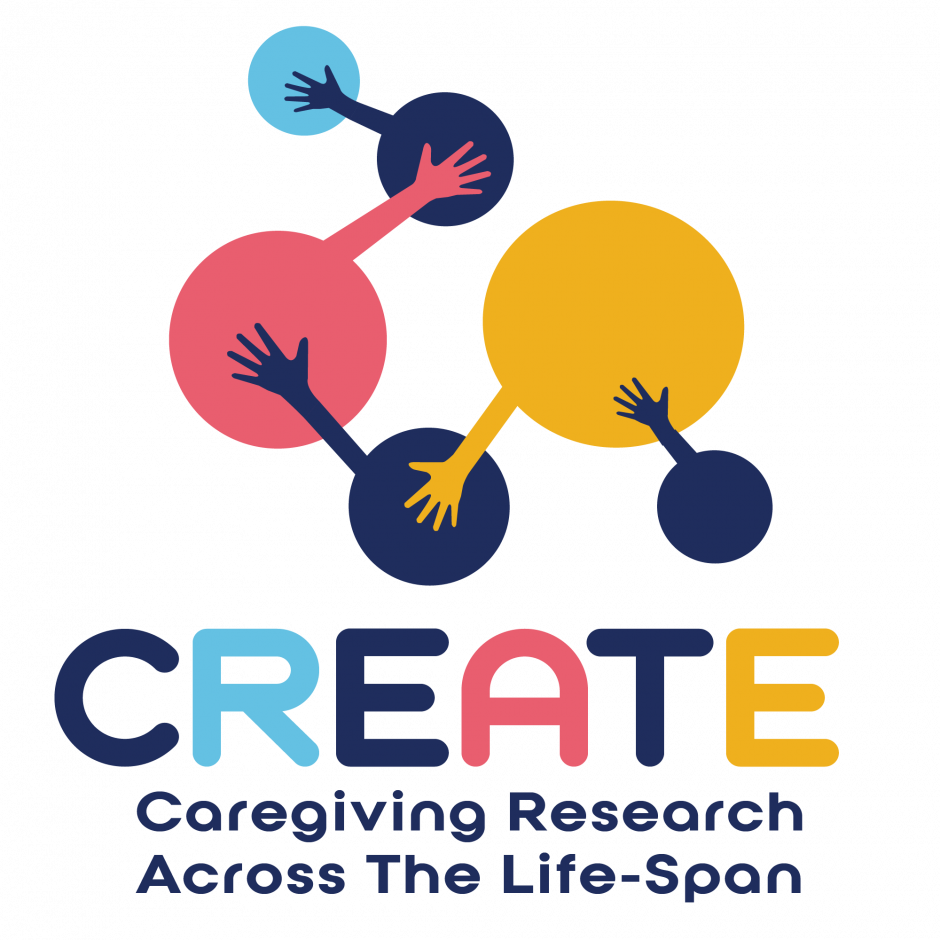
Dr. Jennifer Baumbusch
The purpose of the CREATE Research Program is to:
- illuminate the contributions of caregivers at all points in the life-span
- examine the impact of caregiving on individuals’ mental and physical well-being
- inform policy and clinical practices to support caregivers.
News
November 28, 2025: What Does Family-Centered Care Mean to You? A Qualitative Study Examining Perceptions of Mothers of Children With Medical Complexity

Although family-centered care (FCC) has been widely studied in pediatric settings, research focusing on families of children with medical complexity is limited, especially regarding parental perspectives in the Canadian context. This study explored how mothers of children with medical complexity conceptualize FCC.
Fong, V.C., Baumbusch, J., Khan, K., Lee, E., Bailey, S., MacDonald, K., & Clancy, A. (2025, early view). What does family-centered care mean to you? A qualitative study examining perceptions of parents of children with medical complexity Family-centered care. Journal of Family Nursing, 1 – 11.
November 22, 2025: The Forgotten Caregivers: A Qualitative Study Exploring the Experiences of Fathers of Children With Medical Complexity

This study explored the caregiving experiences and support needs of fathers of children with medical complexity in Canada. Thematic analysis identified fathers’ key roles as financial providers, hands-on caregivers, and as playing a key role in supporting their partners emotionally with the challenges of caregiving. Fathers prioritized the need for peer support, flexible workplace policies and improved access to mental health services.
Fong, V.C., Bandara, N.A., Baumbusch, J. (2025, early view). The forgotten caregivers: A qualitative study exploring the experiences of fathers of children with medical complexity. Journal of Clinical Nursing. https://pubmed.ncbi.nlm.nih.gov/41273249/
October 18, 2024: Pediatric Grand Rounds, Partners on the Path: Working with Children with Medical Complexity and their Families as they Navigate the Healthcare System

LEARNING OBJECTIVES
-Identify recommendations for practice and policy that support family-centered care for children with
medical complexity and their families
-Exploring the lived experience of children with medical complexity and their families as they navigate
the healthcare system
-Describe individual and systemic factors that facilitate or hinder meaningful partnerships with this
population on their healthcare journey
LINK TO RECORDING:
https://ubc.ca.panopto.com/Panopto/Pages/Viewer.aspx?id=8ce3d07c-460b-4b98-846e-b20d015473f0
February 2024: The Golden Ticket: Gaining In-Person Access to Relatives in Long-Term Care Homes During the COVID-19 Pandemic

This study explored family carers’ experiences navigating in-person access to their relatives in LTCH during the pandemic…Findings highlight the patchwork implementation of visitor policies over the initial 17 months of the pandemic and the precarious space family carers continue to occupy within the LTC sector. Future research should focus on formalising support for family presence during public health emergencies
Wu, S. A., Kervin, L., Cooke, H. A., Puurveen, G., Bourbonnais, A., & Baumbusch, J. (2024). The golden ticket: Gaining in-person access to relatives in long-term care homes during the COVID-19 pandemic. Journal of Long-Term Care, https://doi.org/10.31389/jltc.221
January 2024: Perspectives on the representation of frailty in the electronic frailty index

There is currently no standardization of frailty screening in Canadian primary care. In order to implement the eFI in a Canadian context, adaptation of the tool is necessary because frailty is represented by different clinical terminologies in the UK and Canada. In considering the promise of implementing an eFI in British Columbia, Canada, we first looked at the content validation of the 36-factor eFI. Our research question was: Does the eFI represent frailty from the perspectives of primary care clinicians and older adults in British Columbia?
Thandi, M., Wong, S. T., Price, M., & Baumbusch, J. (2024). Perspectives on the representation of frailty in the electronic frailty index. BMC Family Practice, 25(1), 4-4. https://doi.org/10.1186/s12875-023-02225-z
Provincial funding programs should allow immediate family to be paid caregivers: advocates

March 18, 2023: CBC News (Reporter: Michelle Gomez)
Caregiving specialist Jennifer Baumbusch says the policy is “dated” and should be reconsidered, especially amidst a caregiver shortage worsened by the COVID-19 pandemic. “I think people are concerned about the vulnerability of the people receiving care … historically, I understand the rationale to have an arms-length employer-employee relationship.” But Baumbusch says since the pandemic, the care-giving workforce has shrunk. In some situations, those looking to hire a professional caregiver won’t be able to find one.
Available at: https://www.cbc.ca/news/canada/british-columbia/caregiving-funding-spouse-family-1.6783400
September 2023: “Can you hear me OK?”: Caregivers of Children With Medical Complexity and Their Perspectives of Virtual Care During COVID-19

“The rapid and widespread shift to virtual care during COVID-19 created new opportunities and unique challenges for families of children with medical complexity (CMC). However, few studies have examined perceptions of virtual care during the pandemic in this population.”
Fong, V.C., Baumbusch, J. & Khan, K. (2024). “Can you hear me ok?” Caregivers of children with medical complexity and their perspectives of virtual care during COVID-19. Journal of Pediatric Health Care, 38(1), 30-38. doi: 10.106/j.pedhc.2023.08.008
September 2023: Cliff or bridge: Breaking up with the paediatric healthcare system

“Transition from paediatric to adult healthcare is a normal part of the care trajectory, yet the process often leaves much to be desired. In this commentary, I share my family’s journey of this care transition, particularly the handover aspect, by providing examples of different ways that relationships were ended by paediatric healthcare professionals.he rapid and widespread shift to virtual care during COVID-19 created new opportunities and unique challenges for families of children with medical complexity (CMC). However, few studies have examined perceptions of virtual care during the pandemic in this population.”
Baumbusch, J. (2023). Cliff or bridge: Breaking up with the paediatric healthcare system. Paediatrics & Child Health, https://doi.org/10.1093/pch/pxad061
September 2023: A very different place from when the pandemic started”: Lessons learned for improving systems of care for families of children with medical complexity. Journal of Child Health Care

“Coronavirus disease 2019 (COVID-19) created unprecedented challenges for everyone, but especially families of children with medical complexity (MC) who rely on a comprehensive range of health and social services in their daily lives. Yet despite this, there are limited studies exploring caregiver perspectives regarding access to health and social services during the pandemic. To address this gap, we aimed to explore how health and social services can better meet the needs of children with MC and their families.”
Fong, V.C., Baumbusch, J. & Basu Khan, K. (2023, early view). “A very different place from when the pandemic started”: Lessons learned for improving systems of care for families of children with medical complexity. Journal of Child Health Care. 1 – 14. doi 10.1177/13674935231203274
September 2023: “At the epicentre of the COVID-19 pandemic in Canada: Experiences and recommendations of family care partners of an older person living in a long-term care home“

“We conducted a critical ethnography with 24 care partners who cared or had cared for an older person living in an LTCH in Québec during the COVID-19 pandemic...Care partners experienced a forced separation from the older persons they cared for, which resulted in significant distress. Care, including post-mortem care, was considered inadequate and sometimes even inhumane. Communication was inconsistent, and this variability was also noted in visitation rules. Care partners perceived LTCHs as a neglected community…The results illustrated the essential contribution of care partners, and the supportive actions they recommended must be a catalyst for change toward more humane care in LTCH settings.”
Bourbonnais, A., Lachance, G., Baumbusch, J., Hsu, A., Daneau, S. et Macaulay, S. (2023). At the epicentre of the COVID-19 pandemic in Canada: Experiences and recommendations of family care partners of an older person living in a long-term care home. Canadian Journal of Aging/Revue canadienne du vieillissement. https://doi.org/10.1017/S0714980823000466
Webinar Presentation: “Unpaid family/friend caregiving: Strategies for Mobilizing an Equitable Health Promotion Approach“

“This webinar focuses on strategies for mobilizing an equitable health promotion approach in order to support the wellbeing of unpaid family and friend caregivers. The webinar will begin with an overview by Dr. Laura Funk of the caregiving context within Canada and upstream approaches to supporting the health and wellbeing of unpaid family and friend caregivers. The webinar will also include presentations on strategies for supporting caregiving within rural contexts (Dr. Katie Aubrecht), emergency contexts such as extreme weather events (Dr. Jennifer Baumbusch) and supporting caregivers with grief and loss (Zelda Freitas).”
Healthy Aging Collaborative Online Resources and Education (CORE) Canada (July 6, 2023)
September 2022: “Caregivers’ Concerns About Assisted Living Residents’ Mental Health During the COVID-19 Pandemic: A Cross-Sectional Survey Study“

“Family or friend caregivers’ concerns about assisted living (AL) residents’ mental health are reflective of poor resident and caregiver mental health. COVID-19-related visiting restrictions increased caregiver concerns, but research on these issues in AL is limited. Using web-based surveys with 673 caregivers of AL residents in Western Canada, we assessed the prevalence and correlates of moderate to severe caregiver concerns about residents’ depressed mood, loneliness, and anxiety in the 3 months before and after the start of the COVID-19 pandemic..”
Hoben, M., Baumbusch, J., B. Hogan, D., Gruneir, A., A. Chamberlain, S., Corbett, K., E. Griffith, L., McGrail, K. M., E. Amuah, J., E. Lane, N., & J. Maxwell, C. (2022). Journal of Family Nursing, https://doi.org/10.1177/10748407221124159
October 2022: “Older adults experiences of using recreational cannabis for medicinal purposes following legalization“

“Legalization of recreational, or non-medical, cannabis in Canada in 2018 was followed by significant increase in use among older adults. Non-medical cannabis is often used medicinally in this population for issues such as pain, insomnia, and appetite stimulation. The purpose of this study was to explore new cannabis use among older adults within an evolving socio-legal context.”
Baumbusch, J., & Sloan Yip, I. (2022). The International Journal of Drug Policy, 108, 103812-103812. https://doi.org/10.1016/j.drugpo.2022.103812
August 2022: “Prevalence and correlates of anxiety and depression in caregivers to assisted living residents during COVID-19: a cross-sectional study“

“Family and friend caregivers play significant roles in advocating for and ensuring quality health and social care of residents in Assisted Living (AL) homes. However, little is known about how the COVID-19 pandemic and
related visitor restrictions affected their health and mental well-being. We examined the prevalence and correlates of anxiety and depressive symptoms among caregivers of AL residents during the initial wave of COVID-19 in two Canadian provinces.”
Lane, N. E., Hoben, M., Amuah, J. E., Hogan, D. B., Baumbusch, J., Gruneir, A., Chamberlain, S. A., Griffith, L. E., McGrail, K. M., Corbett, K., & Maxwell, C. J. BMC Geriatrics, 22(1), 1-662. https://doi.org/10.1186/s12877-022-03294-y
How B.C. paramedics treat heat illness just changed — so why isn’t the public being told?

July 29, 2022. Vancouver is Awesome (Reporter: Stefan Labbé):
While the early signs of hyperthermia, like heat cramps and nausea, call for oral electrolytes and rest in a well-ventilated or shady place, heat exhaustion or heat stroke requires immediate cooling.
Burnaby’s heat response plan is a start, but health and climate experts want more

June 24, 2022. The Burnaby Beacon (Reporter: Curtis Seufer):
In total, Burnaby residents will have access to six cooling centres and open-air stations this summer. And while that doesn’t include shaded areas, misting stations, and other outdoor areas the city has highlighted as spaces to cool off, one health expert said there should be more advertised cooling areas for a city the size of Burnaby.
“The number of cooling centres is totally inadequate for a city of [that] size,” said Jennifer Baumbusch
Available at: https://www.cbc.ca/news/canada/british-columbia/culturally-specific-day-programs-improve-seniors-mental-health-but-more-are-needed-advocates-say-1.6429808
June 2022: “Disruptions in Relational Continuity: The Impact of Pandemic Public Health Measures on Families in Long-Term Care“

“Although the value of family caregivers’ involvement with relatives in long-term care (LTC) is well recognized, tensions remain regarding their role. Such tensions were exacerbated during the COVID-19 pandemic as strict public health measures restricted family access to LTC homes. Using interpretive description, we examined the impact of visitation restrictions on family caregivers’ experiences caring for a relative in LTC between March 2020 and June 2021.”
Cooke, H. A., Wu, S. A., Bourbonnais, A., & Baumbusch, J. (2022). Journal of Family Nursing, , 10748407221102462-10748407221102462. https://doi.org/10.1177/10748407221102462
Flooding, wildfire emergency plans need to better consider seniors, disabled people: B.C. expert

June 21, 2022. The Abbotsford News (Reporter: Sarah O’Leary):
A combination of disability, low mobility and poverty can leave people in dangerous situations, especially during emergencies like wildfires and floods, University of B.C. nursing professor Jennifer Baumbusch told Black Press Media.
Available at: https://www.abbynews.com/news/flooding-wildfire-emergency-plans-need-to-better-consider-seniors-disabled-people-b-c-expert/
June 2022: “Exploring the Impacts of COVID-19 Public Health Measures on Community-Dwelling People Living With Dementia and Their Family Caregivers: A Longitudinal, Qualitative Study“

“Since the onset of the COVID-19 pandemic, community-dwelling people living with dementia and their family caregivers have experienced many challenges. The unanticipated consequences of public health measures have impacted these families in a myriad of ways. In this interpretive policy analysis, which used a longitudinal, qualitative methodology, we purposively recruited 12 families in British Columbia, Canada, to explore the impacts of pandemic public health measures over time.”
Baumbusch, J., Cooke, H. A., Seetharaman, K., Khan, A., & Khan, K. B. (2022). Journal of Family Nursing, 28(3), 183-194. https://doi.org/10.1177/10748407221100284
Culturally specific day programs improve seniors’ mental health but more are needed, advocates say

April 25, 2022. CBC News (Reporter: Baneet Braich):
Past research has shown that attending adult day programs can help reduce stress, and decrease sleeping problems and home behavioural issues, such as agitation, according to Jennifer Baumbusch, an associate professor of nursing at the University of B.C who is researching day programs.”There are huge health benefits.”
February 2022: “Research priority setting with parents of students with learning exceptionalities and disabilities“

“The purpose of this study was to explore the research priorities of parents of Kindergarten to Grade 12 students with learning exceptionalities and disabilities in British Columbia, Canada”
Baumbusch, J., & Lloyd, J. E. V. (2022). British Journal of Special Education, 49(2), 209-229. https://doi.org/10.1111/1467-8578.12405
January 2022: “The unintended consequences of COVID-19 public health measures on health care for children with medical complexities“

“Public health measures implemented in the initial months of the pandemic decreased access to health care services for children with medical complexity. The long-term ramifications of these measures are unknown. Family structure was found to influence decisions to avoid accessing Emergency Department care. Given the volume of services used by these children, paediatric hospital leaders need to take their unique needs into consideration in disaster planning to ensure minimal disruptions in care.”
Baumbusch, J., Lloyd, J. E. V., Lamden-Bennett, S. R., & Ou, C. (2022). Child : Care, Health & Development, https://doi.org/10.1111/cch.12968
Advocates and researchers say people with disabilities are left out of BC COVID strategy

January 22, 2022. Capital Daily (Reporter: Astra Lincoln): Since the fifth wave has begun, UBC professor and nurse Dr. Jennifer Baumbusch says there has been a shift in tone. “It’s become more explicit that people with disabilities should be responsible for taking care of themselves by isolating, while everybody else can get on with life.”
Available at: https://www.capitaldaily.ca/news/people-with-disabilities-bc-covid-strategy
COVID-19: Long-term care restrictions another blow to isolated residents.

January 3, 2022. The Vancouver Sun (Reporter: Denise Ryan): Research examining the impact of B.C.’s essential visitor policy by Jennifer Baumbusch, an associate professor in the school of nursing at UBC, found that “visitation restrictions arising from public health’s pandemic response have unintentionally compromised these familial bonds and access to specialized family care, potentially contributing to further physical and cognitive decline, and distress among residents.”
Available at: https://vancouversun.com/news/local-news/i-want-to-die-care-restrictions-another-blow-to-isolated-residents

CIHR Chair Dr. Jennifer Baumbusch

Dr. Jennifer Baumbusch is the CIHR Chair in Sex and Gender Science with a focus on the Dynamics of Caregiving in an Aging Society (2020 – 2024)
This CIHR Chair focuses on:
a) Sex and gender science research
b) Methodological advances in sex and gender science
c) Capacity building
Contact us
Dr. Jennifer Baumbusch
Phone: 604-822-7496
Email: GERO@nursing.ubc.ca
Bluesky: @GEROnursing
LinkedIn: Jennifer Baumbusch
